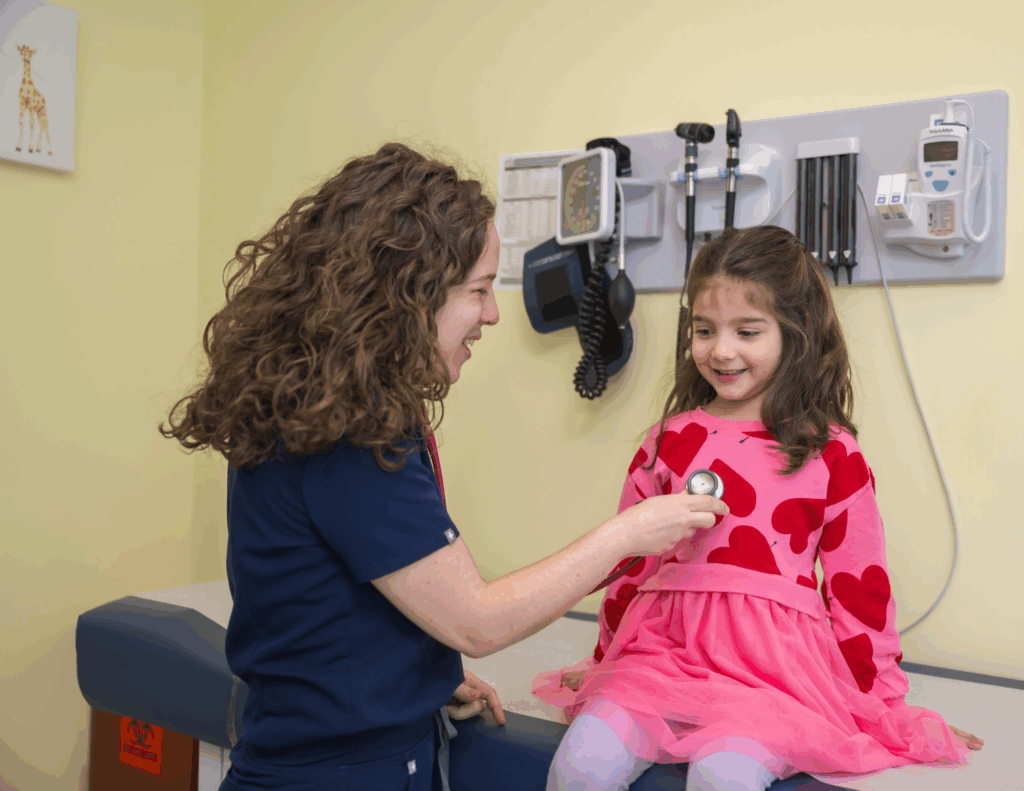July 31
Healthy Habits for Kids: Vaccines, Nutrition & Wellness
How to Raise Healthy Kids: Vaccinations, Nutrition & Care
As a parent, you make many choices every day to help your children grow up healthy and strong. With so much information coming at you from every direction, it can be hard to make sense of it all and know you have a strong grasp of healthy habits for kids that genuinely work.
As a community health center, LCH partners with parents to provide well-researched, factual information. Our goal is to support your efforts to raise healthy kids and be a reliable resource for every stage of their growth and development.
Building Healthy Habits for Kids Early
When children develop healthy habits early, not only do they get sick less often, but they also carry many of those habits into adulthood.
Healthy kids don’t have to stay home sick from school, which leads to higher grades and consistent social experiences. They usually have more energy, strong muscle development, and physical growth, all of which are great foundations for sports and other activities. All of these benefits work together to create more opportunities for healthy kids to be successful as they leave high school for the next phase of life.

Because those habits were established in childhood, healthy young adults can easily maintain them. Now, they are set up for a lifetime of great health that they can pass on to their own children.
When parents want to learn more about setting healthy habits for their kids, and their entire families, we encourage them to start learning the basics of Child Development. This helps parents keep track of milestones and general growth expectations through every phase of childhood. Next, we review these 3 key pillars of raising healthy kids:
- Vaccinations
- Nutrition
- Regular Checkups
Teaching healthy habits to your kids is often a team effort. Parents maintain habits at home while pediatricians and community health providers offer vital services to support their progress.
Staying on Track with Childhood Vaccination Schedules
Childhood vaccinations are essential to maintaining healthy kids. Although keeping up with the pediatric immunization schedule is more of a habit for parents than for kids, it should set the standard for the importance of routine vaccinations.
Vaccines, or immunizations, prevent a multitude of serious illnesses and diseases. Now that kids can be vaccinated against dangerous illnesses like polio, measles, hepatitis, tetanus, and whooping cough, they will also avoid the long-term effects that often come along with a diagnosis.
The Pediatric Offices in our West Grove location treat children using the American Academy of Pediatrics (AAP) vaccine schedule. This schedule spreads immunizations along a timeline from birth until age 18 to ensure that children receive important protections as they age. Our team is always happy to discuss the schedule with parents, and to help children get up to date on any missed vaccines they need when they visit our office.
Some parents have concerns about vaccines. With so much information in the media and on the internet, it’s hard to know what to believe. As a community health provider, our mission is to improve the health and well-being of families in Chester County. That means we take our patient concerns very seriously and will provide evidence-based resources that help parents understand the facts about vaccines. Childhood vaccinations are a safe and highly effective line of defense against serious illness.
Nutrition Tips for Growing Kids
When it comes to creating good habits, healthy eating for kids is one that will last a lifetime. Children who learn positive nutrition principles from an early age usually keep that mindset throughout their childhood, teen years, and adulthood. They simply enjoy healthy foods, and they know that eating well keeps them feeling well!
Good nutrition takes effort, but it is always worth it. Parents do not have it easy, having to face all the temptations of processed foods, sugary drinks or treats, and convenient snacks that are on every store shelf. By making a commitment to healthy eating for kids at the youngest ages, parents will avoid having to face many food battles as their kids grow.

A healthy diet consists of whole foods. A good rule of thumb is to shop around the edges of the grocery store. This means buying fresh fruits, vegetables, fish, meat, and dairy. Frozen plain produce and meat are also great to keep at home. Whole grain items are actually in the inner aisles of the store, but try to avoid the temptation to buy products with multiple ingredients or a lot of processing.
A few ways to build healthy eating habits for kids include:
- Preparing fresh meals at home as often as possible
- Inviting kids to help make meals or bake goodies
- Teaching kids to read labels at the grocery store
- Learning together about which essential nutrients are in different foods
- Eating meals together as a family
When kids understand how food affects their health and growth, they have more tools to make healthy choices. By taking an interest in how food is prepared and what a healthy plate looks like from a young age, kids are more likely to value nutrition their whole lives.
Preventing and Managing Common Childhood Illnesses
Although healthy habits certainly reduce illness, they don’t always prevent it completely. Common childhood illnesses still happen, even among healthy kids.
When kids go to school, spend time with friends, and participate in their community, they have natural exposure to common germs and viruses that affect us all. The good news is that kids with healthy habits, and who are up to date on vaccinations, are likely to have strong immune systems that are equipped to fight off those bugs.
Common childhood illnesses include colds, ear infections, stomach bugs, and the flu. These pop up at different times of the year, often with changes in the seasons and weather. Some kids will get sick less and less as they get older, especially if they are building healthy habits around nutrition and regular pediatric care. But viruses can be unpredictable, and sometimes kids just get sick.
To prevent illnesses or minimize how long they last, make sure your child is practicing good hygiene habits. This includes regular handwashing, enough sleep, and staying hydrated. When they do have a bug, remind them to cough into their elbow, wash their hands often, and avoid touching their friends or younger siblings. Kids should stay home from school or other activities if they have a fever, an ongoing cough, or if they have been throwing up.
Most common viral illnesses can be managed at home without needing a sick visit to our offices. Parents should call our office if they want to review their child’s symptoms, find out which over-the-counter medicines are right for the situation, or make an appointment. Always come in for a sick visit if your child has a high or long-lasting fever, a fever with a rash, vomiting and diarrhea, body chills and aches, or ear pain.
Why Well-Child Visits are Essential
Well-child visits are for all kids, even if they never get sick. Well visits are an important part of pediatric care. This is how we keep track of how your child is growing and developing. We also screen for health concerns that are harder to identify in everyday life – things like hearing, vision, blood pressure, developmental delays, and more. Finally, regular well checks help us keep up great communication with you and your child. We can encourage healthy habits for kids and families, keep up with immunizations, and address any questions or concerns you have about your child’s growth.

If you have not brought your kid to the pediatrician in some time, go ahead and schedule a visit with our West Grove Pediatrics office. No matter how long it has been, or even if you have never been to an LCH location, we are here to provide timely pediatric care for your family. Our office is in the Jenners Village Professional Building at 105 Vineyard Way, Suite 103, West Grove, PA 19390. You can also call us at 610-444-7550 to make an appointment.
Frequently Asked Questions About Well-Child Visits
We want all of our patient families to feel comfortable asking us any questions they have about pediatric care and well-child visits. Check out these frequently asked questions, and reach out to our team if you don’t find your answer below.
Do I need to bring vaccination records?
If you have your child’s records from another doctor, please bring them to your appointment. If you have a pediatric record with us, we’ll have it here already. If you don’t have your child’s records, that’s okay! We’ll go over our recommendations based on your child’s age and how long it has been since their last well-child visit.
How often should my child see the doctor?
During your child’s first 2 years of life, we like to see them every three months to chart their growth and administer vaccines on schedule. After that, we will schedule well-visits about once a year to keep them on track with vaccines. If we have concerns about a child’s growth and development, we may schedule a mid-year visit to catch any potential health conditions.
What happens if my child misses a vaccine?
If your child misses a routine vaccine, we will catch up at your next well-child visit. While the recommended schedule is ideal for optimal health, there is flexibility in when children can receive vaccines to get back on track.
How do I prepare my child for their appointment?
We encourage parents to talk about visiting the pediatrician with their children so that it is a normal and expected healthy habit. Just like eating well, exercising, and getting good sleep, kids need to visit the doctor as part of growing up strong and healthy. If your child has a particular fear of shots, let us know. Our nurses and providers are great at helping kids feel more comfortable with this important part of pediatric care.
How LCH Community Health Supports Your Family’s Wellness
At LCH Pediatrics, we are passionate about supporting kids in the habits that will help them grow up happy and healthy. We enjoy meeting kids and their parents to promote overall wellness for the whole family.

Our Pediatric office offers well-child visits, sick visits, health screenings, vaccines, chronic health condition management, and treatment of minor injuries. Patients are encouraged to also schedule routine dental care with the LCH Dental Center in the same West Grove location. The Pia Center for Behavioral Health provides mental health care services at all LCH locations.
LCH offers bilingual services anytime they are needed through bilingual staff members and/or Language Assistance Services. Financial assistance is available for families who do not have the ability to pay, and our team can assist with social services eligibility and enrollment in all of our locations.
To ask questions, learn more about building healthy habits for your kids, or to schedule a well-child visit at our pediatric office, please contact us. We look forward to supporting your child’s health and wellness!
